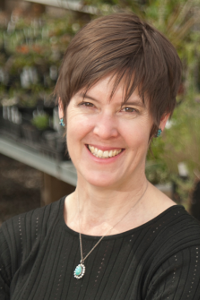Circadian rhythms are turning heads: clock regulation of sunflower growth and development

Dr. Stacey Harmer
April 5 at 12:20pm in the Fralin Auditorium, Fralin Hall room 102
Hosted by Dr S. Kojima
Stacey Harmer is a Professor in the Department of Plant Biology at UC Davis. She received a BA in Biochemistry from the University of California, Berkeley and was awarded a PhD in Biochemistry at UC San Francisco. She then moved to a postdoctoral scholar position at the Scripps Research Institute. Her lab studies plant adaptations to the abiotic environment. Specifically, her research focuses on the plant circadian clock, addressing both the molecular nature of the oscillator that generates daily rhythms and aspects of plant physiology affected by the circadian system. She is particularly interested in exploring relationships between clock, light, and growth signaling pathways. Her recognitions have included a Howard Hughes Predoctoral Fellowship, an NIH National Research Service Award, an American Society for Photobiology New Investigator Award, the UC Davis College of Biological Sciences Faculty Research Award, and the UC Davis Chancellor’s Fellowship.
In plants as in other complex eukaryotes, the circadian clock influences a wide range of biological processes. Since plants are rooted in their environment, they make an excellent model system for investigating how organisms can integrate internal temporal information generated by the clock with environmental cues to control physiological pathways. In previous work, we found that the circadian clock plays an important role in the generation of solar tracking rhythms in sunflower and that these daily movements enhance plant growth and biomass. We are currently investigating the molecular pathways that underlie these predictable daily rhythms in behavior. We are also examining the role of the clock in the uniform eastward orientation of mature sunflower inflorescences and in the timing of late-stage floret maturation. We have found that orientation affects the timing of pollen release, the frequency of visits by pollinating insects, and siring success. Physiological studies have revealed clock, light, and temperature regulation of the timing of pollen release and suggest mechanisms by which internal and external cues cooperate to fine-tune the timing of flower development and enhance reproductive success.
Circadian regulation of sunflower heliotropism, floral orientation, and pollinator visits.
Atamian HS, Creux NM, Brown EA, Garner AG, Blackman BK, Harmer SL.
Science. 2016 Aug 5;353(6299):587-90. doi: 10.1126/science.aaf9793.
PMID: 27493185
Turning heads: the biology of solar tracking in sunflower.
Vandenbrink JP, Brown EA, Harmer SL, Blackman BK.
Plant Sci. 2014 Jul;224:20-6. doi: 10.1016/j.plantsci.2014.04.006. Epub 2014 Apr 13. Review.
PMID: 24908502
Wheels within wheels: the plant circadian system.
Hsu PY, Harmer SL.
Trends Plant Sci. 2014 Apr;19(4):240-9. doi: 10.1016/j.tplants.2013.11.007. Epub 2013 Dec 24. Review.
PMID: 24373845

This seminar will be livestreamed on the Fralin YouTube channel, but will not be recorded.


